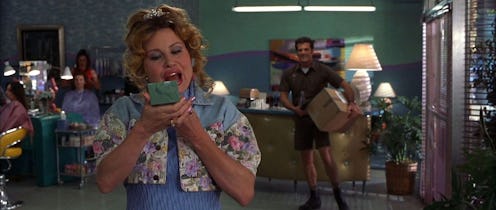Fashion
Paulette Is The Best Character In 'Legally Blonde'

If there was ever a cinematic feminist masterpiece, it would have to be Legally Blonde. Legally Blonde challenges perceptions of women in academia, in society, and in the media at large. The film and, in particular, Elle Woods' character, simultaneously proves that women are so much more than their looks, but that being interested in your appearance is neither a vapid nor useless pastime.
The stereotype of the blonde Barbie girl who can do nothing but look good is not only discussed but eradicated in Elle Woods' time at school and subsequent legal career in Legally Blonde 2: Red, White, And Blonde. Not only does Elle smash stereotypes, but she uses them in her favor. Like in the infamous perm stand-off scene in court, where her knowledge of fashion and beauty is not simply valuable, but key in destroying the defense's argument.
But while the Legally Blonde titular character is a feminist icon in her own right, I feel that Paulette — played by actor Jennifer Coolidge in both movies — is a much more necessary and needed persona. She isn't a woman sought after for both her beauty and brains, per se, but a character who is arguably more relatable to the general public.
We meet Paulette first and foremost as a nail technician: A woman giving advice to Elle about her relationships while revealing that her own aren't all that great. She fancies the mailman and her ex-husband is, to put it lightly, something of a dick. Nonetheless, Paulette is loud. She is brash and happy and she has a style all of her own.
As we get to know Paulette more, we learn that she is a character totally alienated from the world that Elle Woods knows and loves. She is working class. She didn't finish high school — let alone go to college, let alone go to Harvard.
Paulette is also fuller figured and works hard at making other people look beautiful while listening to their problems. As she says in the film, "I'm a middle-aged, high school drop out with stretch marks and a fat ass."
When Elle befriends her, the sense that she is there to help Paulette in a way that nobody else has before is tangible. She hopes to inspire confidence and sexuality in a woman who's been underestimated her entire life, both in her relationships and through her own self-worth (or lack thereof).
This friendship is one that is seemingly meant to show the kindness in Elle Woods' character. Her ability to see past class, to befriend and inspire others, and to represent the powerful nature of female friendship is a sight to be seen.
But where Elle Woods has "never let anything stop her," I can't help but feel that she never really had many obstacles in her way. Her wealth, her looks, and her intelligence are integral to her entire story, because without them there wouldn't necessarily be a story.
Although Elle's privilege is never addressed in Legally Blonde — the film is too busy fighting stereotypes about bimbos to bother — Paulette's lack of privilege isn't either. While the latter may come from a totally different social and economic situation from every other character in Legally Blonde and Legally Blonde 2, she is never treated differently for it. And similarly, she is never treated differently for her "fat ass."
This film isn't just a lesson in how blonde sorority girls aren't vapid idiots, but a lesson in how women should treat and respect each other. Although this is addressed in the narrative through Elle and ex boyfriend Warner's new girlfriend Vivian Kensington's rivalry and eventual friendship, I feel that Elle and Paulette's BFF status stands for so much more (and in a much subtler way).
Vivian and Elle's differences lie with the man who has wronged both women as well as their individual tastes in clothes. Paulette and Elle, however, are different in age, lifestyle, class, bodies, style, and so much more. Yet the women still become best friends and use that status to support and inspire one another.
Paulette's character ultimately stands out amongst the rest because of her aesthetic and internal differences to the rest of the cast. In a society that is inherently against fuller figures and loud female personalities, her character feels all the more important. Especially when we consider that Paulette represents the average woman so much more than sorority girls and Harvard graduates ever could.
The film is heavily laden with important references to girl power and feminism, but in Paulette, these points have long been underrated.
Still, Paulette's character stands against a sea of patriarchal and sexist notions. Although middle-aged, she fits in comfortably with her new, younger friends and isn't shoehorned into the "mom figure" role. She even embraced the more powerful side of her persona by standing up to her ex and pulling the (mail)man of her dreams.
Nowhere near as wealthy, book-smart, or privileged as her new bestie Elle Woods, Paulette is in no way seen as "less than" for her social standing.
Paulette might have a fat ass and stretch marks (much like so many of us do). But through Elle's help, she doesn't let this stop her from doing anything that she wishes to do.
Essentially, Paulette is a woman of the people — something this film definitely needed. She counterbalances a story that is set amongst the rich and intelligent elite and she does so in curve-friendly outfits that are just as fabulous, fun, and glamorous as the many looks Elle Woods is still known for today.
Images: Metro-Goldwyn-Mayer Productions (6)